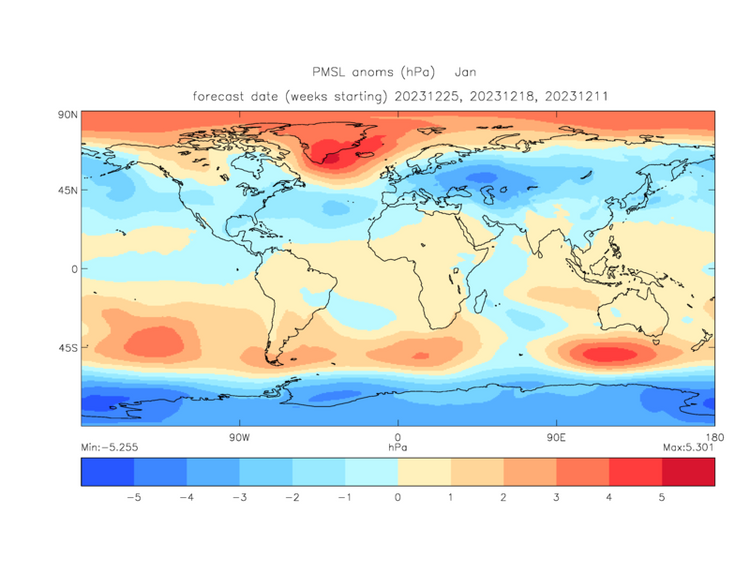How long will the cold last?

Could the prevailing low temperature continue or are we expecting a comeback of the moist and gusty weather which we encountered during the holiday season?

Following the unpredictable and chaotic holidays of Christmas and New Year's, we are now experiencing a sudden shift towards significantly chillier temperatures. January's weather is below average for a majority of the United Kingdom and the possibility of cold weather becoming problematic is increasing. Expect frost throughout the night, and due to the dewy environment, still weather, and lengthier nights, there is also a chance of icy conditions and fog.
There is plenty of guessing going on about how much longer the cold weather will continue and how low the temperatures will go. To find out, we have to search outside of the UK. When we check weather predictions for more than five days in advance, the weather all over the world can have a huge influence on our weather in the UK and cause enduring weather that we will experience here.
The weather all around the globe is connected, and when making predictions that look further into the future, we depend on parts of the worldwide weather and climate system that don't change quickly. These are called climate drivers. Some of these drivers have a significant impact on the weather in the UK this season – but what are they currently up to?
The Pacific Ocean is currently experiencing a powerful El Niño, which is a natural heating of the water. This means that the possibility of having a colder and drier second half of winter and early spring is higher than usual.
A sudden warming in the stratosphere is happening, but it's not a big deal right now. The winds up there are only going to get weaker and not reverse completely. However, this could still affect the weather down here on the ground because the Polar Vortex in the stratosphere is much weaker than usual and there's still a chance that a big warming event could happen later in the winter.
A sudden stratospheric warming (SSW) can cause a "stuck" weather pattern in the UK, which means less low-pressure systems from the Atlantic will pass over the country. This can raise the likelihood of dry, cold weather in the UK while bringing mild, rainy and windy conditions to southern Europe. However, an SSW's effect on the UK's weather can also be harmless and isn't always accompanied by chillier conditions.
According to Professor Adam Scaife, who is in charge of predicting the weather from far in advance at the Met Office, the weakening of the stratospheric polar vortex supports the forecast for the next month. This forecast predicts that there will be more blocked, colder and drier conditions.
This winter, the UK is being influenced by the Quasi-Biennial Oscillation (QBO), which is a consistent change in the winds that circulate above the equator. The QBO is in an easterly stage at the moment, which raises the possibility of cold winds from the north or east, originating from Arctic and continental Europe.
In the meantime, the North Atlantic Oscillation which affects the pressure on the surface across the North Atlantic area is becoming negative. This means that there is a lower possibility of storms occurring and a higher possibility of cold weather happening. The current arrangement of sea surface temperatures in the North Atlantic Ocean is another aspect that contributes to a decrease in the likelihood of westerly winds bringing storms.
These impacts are occurring while UK winters are getting warmer, which aligns with the general global warming trend.
As a result of analyzing all the factors affecting weather patterns worldwide, our prediction models indicate that there is a greater likelihood of temperatures being below normal for the remainder of this winter. This raises the possibility of severe cold weather effects, including snow and ice.
It's crucial to keep in mind that long-range and seasonal weather predictions are advanced fields of meteorology, and are subject to uncertainties. The Met Office is a leading institute regarding research in this area. However, even with accurately developed prediction systems and precise observations, weather forecasting will always be limited by the unpredictable and chaotic nature of the atmosphere.
Although there may be various assumptions that you discover elsewhere, the current scientific knowledge does not provide precise information regarding the quantity of rain or snow within the following months, nor the exact timing of severe weather events. Nonetheless, long-term predictions can offer valuable insight into the probability of diverse weather conditions across the entire UK during the season.
On our site, you can take a look at the extended weather forecast for a longer period and the daily forecast for today's weather. Additionally, you can keep up with us on social media platforms such as Twitter and Facebook, or our mobile app accessible on the App Store for iPhone users and Google Play Store for Android users. Our three-month predictions are updated monthly to provide the latest weather information. Make sure to keep an eye on the weather warning page for alerts on severe weather conditions.

























































